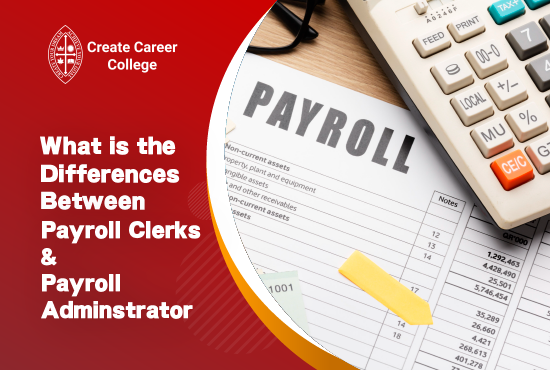What is the difference between a payroll clerk and payroll administrator? | Job Responsibility, Skills and Education Requirement
2024-08-22 2024-11-27 16:15What is the difference between a payroll clerk and payroll administrator? | Job Responsibility, Skills and Education Requirement
What is the difference between a payroll clerk and payroll administrator? | Job Responsibility, Skills and Education Requirement

In any organization Payroll Specialist is very important to keep everything going in the right and estimated order by handling payroll records, and distributing timely paychecks to the employees and staff accurately. After completing an accounting diploma or payroll certificate, stepping onto the payroll position can be a popular and advantageous start to your accounting career.
If you, like many others, are planning to start your career as a payroll professional and are curious to know: “What is the difference between a payroll clerk and a payroll administrator?”. But this is an article that explains in full detail these two roles: job responsibilities, challenges a career face, and development.
Table of Contents
ToggleDifferences between a Payroll Clerk and a Payroll Administrator
In the workplace, or on job searching websites payrollers are commonly referred to as the payroll clerk or the payroll administrator. Both of these have similar job responsibilities and duties, but these roles are structurally different from each other.
Payroll Clerk
Payroll Clerk is the foundation of a payroll department in an organization to accomplish all the necessary payroll operations, such as verifying employees timesheets, maintaining payroll records, and calculating and adjusting employees salaries. They make sure all employees are paid with due date and in accordance to tax law and regulation.
Responsibilities and tasks typically assigned to payroll clerks:
- Data entry into the payroll system
- Verify work hours on employees’ timesheets
- Calculating employee wages accurately
- Adjusting employees’ wages and salaries based on deductions and other compensations
- Handling employees’ inquiries relating to pay and providing comprehensive guidance
- Generating payroll reports for audits
Payroll Administrator
Responsibilities of a Payroll Administrator:
- Overseeing the entire payroll process
- Managing and adjusting the benefit plans regarding employees’ status
- Ensuring the payroll process is compiled with tax laws and regulations and file taxes on time
- Developing payroll policies regarding companies’ financial needs and government regulation
- Supervising and training payroll clerks
- Addressing and handling complex payroll issues
Educational Requirements For Payroll Professional
Educational Requirement for Payroll Clerk:
- Most of the entry-level positions just require applicants to have a high school or equivalent qualification
- Some companies may require applicants to have accounting, financial, or other related subjects and experience depending on companies and industrial needs
- Payroll clerks may be required to have job training in payroll systems or software used by the companies
Educational Requirement for a Payroll Administrator:
- Payroll administrator roles usually require applicants to obtain at least a diploma or degree in accounting, financial, or other related fields
- Some of the payroll administrators are required to obtain certification for specific payroll operations depending on company needs and business type
Specific Skills Necessary for a Payroll Clerk
- Data entry skill to enter employees’ payroll information, including wage rate change, and financial transaction data, into accounting and financial management system
- Prepare records of employment, timesheet, and wage rate accurately and on time bi-weekly or monthly
- Execute basic payroll calculation for wage deduction and withholdings through the payroll system under the organization’s payroll policies.
- Demonstrate attention to detail to identify and correct errors in payroll records and timesheets
- Basic understanding of payroll software, tax law, and regulations
Additional Skills and Qualities Expected From a Payroll Administrator
- Handle complex payroll-related issues and computation, such as bonuses overtime deductions
- Develop organization payroll policies and ensure the entire payroll process is executed smoothly and effectively
- Keep updating payroll policies with the latest tax legislation to ensure tax paperwork is filed correctly and timely
- Good team management to manage and supervise payroll clerks
- High proficiency in the latest payroll software technologies and adapting to the current payroll system
Career Development of Payroll Administration
The career progression between payroll clerk and payroll administrator are as follows:
Payroll Clerk:
- Career advancement for a payroll clerk often involves promotion to a senior role, in which they take additional responsibilities and supervise junior staff within the organization
- The payroll clerk might take the responsibility to oversee the entire payroll process and other daily operations to ensure the payroll data is executed accurately and on schedule
- A payroll clerk may be assigned to handle specific payroll areas, such as benefits administration, compliance management, or payroll data maintenance
Payroll Administrator:
Becoming a payroll administrator, the employee may be promoted to be a payroll manager who heads a payroll department and coordinates their procedures and guarantee that policies and payroll system are in line with legal regulations.
As a pay administrator, if one obtains certain certifications regarding payroll, accounting, or finance work he can be taken into executive level jobs for accounting or finance.
Challenges in Payroll Management
- Staying updated on the changes in tax legislation and regulations
- Highly proficient with the latest technologies of payroll software and system
- Ensuring data accuracy with no errors to avoid penalties
- Handling employees’ concerns and providing comprehensive payroll guidelines for them
- Maintain high-security protection of confidential payroll record
How to be a Payroll Professional?
The most effective way to be a payroll professional is by enrolling in a 1 or 2 year accounting diploma at an accredited education institution. The 2-year Accounting Diploma with COOP work experience at CCC College could provide an excellent starting point for you to launch your career in accounting.
Tailored Course Design for your career success
To meet the requirements of payroll job, students are prepared with comprehensive fundamental accounting skills on accounting principle, payroll administration, taxation as well as others with this diploma. Lectures, assignments, and co-op work placement are combined in the programme to prepare graduates to start working after completing the diploma on a career path which lines up with a standard of Chartered Professional Accounts (CPA) and Public Business Accountancy.
Real World Coop Work Experience
The full-time co-op work permit allowed students to apply what they were learning on production and would contribute to their employability in various industries. With students, these valuable experiences could also help them learn industry practices and network with the professional contact for their future career avenue.
All-round Career Support
It’s important for us to help our students to succeed in career and academically. If you haven’t yet, know that we offer co-op specialists always available to walk you through each step of your career journey from co-op opportunities to job fairs, workshops, resume and interview preparation, and expert HR advice.
Conclusion
Some people might have a little confusing difference between the payroll clerk and payroll administrator because realization, there are similarities between the two roles. However the responsibilities of payroll administration are greater, more complex and a lot more extensive as compared to that of payroll clerk. Thus, it is this reason why payroll administrators are also in career progression as their salaries or payroll administrations are required to be knowledgeable of professional from certified degrees or particular diplomas.
Hope this article will give you a clear answer on “What is the difference between a payroll clerk and a payroll administrator?”. If you want to learn more on how to be a payroll administrator, you can contact our student advisors for detailed information.
FAQ
What is the main difference between a payroll clerk and a payroll administrator?
The main difference lies in their responsibilities: a payroll clerk handles basic payroll tasks such as data entry and wage calculation, while a payroll administrator oversees the entire payroll process, manages complex issues, and develops payroll policies.
What are the educational requirements for becoming a payroll clerk?
A payroll administrator typically needs at least a diploma or degree in accounting, finance, or a related field. Some positions may also require specific certifications depending on the company and industry.
What qualifications are needed to become a payroll administrator?
A diploma or degree from accounting, finance or an equivalent is what would be required for most payroll administrators. Some companies and industries may also require certain certifications to satisfy some position.
How does career progression differ between a payroll clerk and a payroll administrator?
After years of experience, payroll clerks can move up to senior positions with added deeds or specialize on the areas like benefits admin. If you are payroll administrator, you can move on to a payroll manager or higher executive position in accounting or finance.
What are some of the challenges faced by payroll professionals?
In order to maintain high existence with payroll software, payroll professionals must also stay updated on tax legislation, to handle employee inquiries and protect payroll confidentiality.
Related Posts
CELPIP Listening Strategies: 5 Tips for High Scores
TEF Canada Preparation: Guide to NCLC 5 & NCLC 7 in French Speaking
CELPIP reading practice test (with answer)
What’s a Good TEF Canada score?
Latest News
CCC Admission Department


Latest Posts
- CELPIP Listening Strategies: 5 Tips for High Scores

- How to Archive B2 Level French in TEF Canada Speaking with Examiner Insights & Strategies



- TEF Canada Preparation: Guide to NCLC 5 & NCLC 7 in French Speaking



- CELPIP reading practice test (with answer)



- What’s a Good TEF Canada score?



- CELPIP Writing Samples with Answers (Task 1 & Task 2)



- Top 12 Highest Paying Digital Marketing Jobs



- Francophone Community Immigration Pilot | New Path to Canada PR in 2025















